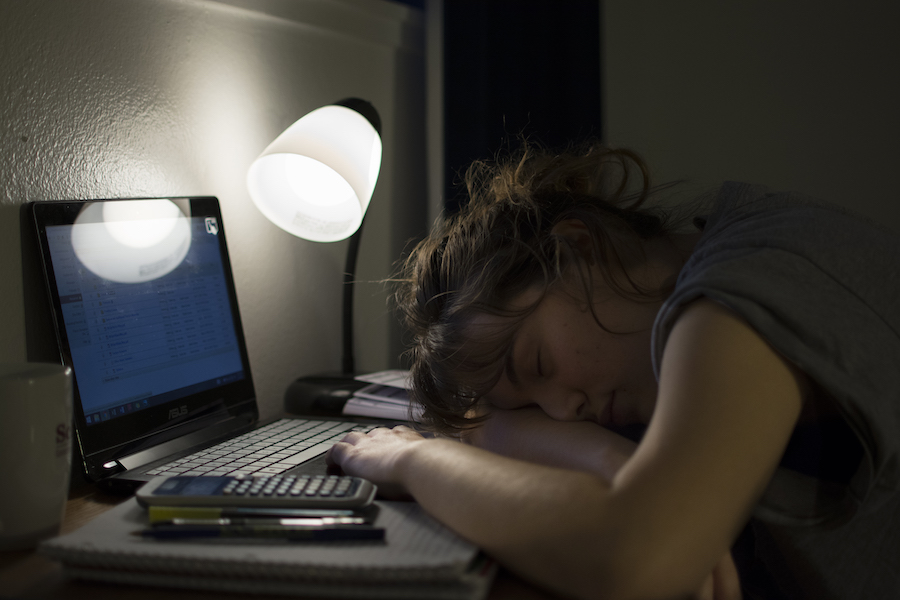
Jawbone study finds UC Davis students receive average of six hours and 45 minutes per night
As the second round of midterms sweep UC Davis, students are beginning to experiment with large doses of caffeine and energy drinks to prepare for their exams and papers. At least this is the narrative on college campuses that a study from Jawbone, a consumer technology company, may just prove to be true.
According to Jawbone, students at UC Davis rank sixth in the nation for getting the least amount of sleep at six hours and 45 minutes a night on average per student and an average bedtime at about 12:42 a.m. The only other UC above UC Davis was UC Irvine, which ranked at number five. The other UC schools that made it into the top 25 most sleep-deprived schools include UC Berkeley, UCLA and UC San Diego.
The study tracked 18,000 students at over 140 schools across the country and logged their nights of sleep from 2013 to 2016. The students who participated in the study wore the UP, a device created by Jawbone to monitor their sleep and fitness activities, for at least three months during their academic year for the study’s three-year duration. To compute sleep averages by university, Jawbone’s data team computed the average sleep for men and women, then weighted them by the gender distribution of the school.
The study ignored the time students spend in bed awake and their naps throughout the day, only taking into account actual time spent asleep during the night.
Brian Wilt, director of data science and analytics at Jawbone, said that there was a strong relationship between the late bedtime of students and the school’s rank on the US & World Report 2016 Ranking, an international ranking of universities based on quality of education.
“We see a strong relationship between a school’s average bedtime on weeknights and their US News and World Report’s 2016 college ranking (data nerds: r2 = 0.45),” Wilt said in his article. “The tougher the school, the later the students go to bed, with Columbia and UPenn having the latest bedtimes.”
Although this was the trendline Wilt found, UC Davis ranked lower on the list of bedtimes in correspondence to its ranking on the US & World Report. However, UC Davis students, according to Wilt’s study, rank higher on lack of sleep, meaning that UC Davis students wake up earlier than students at other universities.
According to Merril Lavezzo, the sexual and mental wellness health educator for UC Davis Student Health and Counseling Services (SHCS), the study is not something to be overly concerned about for students at UC Davis.
“Stress and sleep are correlated, so this is a huge issue, but we have to keep in mind that the number 25 school on the list, NYU, is only getting six minutes of extra sleep, which isn’t huge,” Lavezzo said. “Plus, the recommended time frame [from the CDC] is seven to nine hours, so students are getting close, so I’m not totally discouraged, and it’s not something new. It just reminds me to think of more creative ways to help.”
Lavezzo went on to give some tips for students who want to create more well-rounded sleeping patterns, including exercising in the middle of the afternoon and not before bed, waking up to sunlight or other light sources and going to bed at approximately the same time every night, including weekends and holidays.
Some resources from SHCS available to UC Davis students include a healthy sleeper blog and the mindfulness and relaxation podcast.
Harmani Sethi, a first-year managerial economics major, feels like she has not gotten enough sleep during some points of the academic year, particularly around midterm and finals week.
“It makes sense since Davis is a really competitive school that a lot of kids don’t sleep as much, but I think [sleep deprivation] should be alleviated even though I am not sure how. Part of it is just the quarter system because you have so much going on,” Sethi said. “Maybe we should look into starting classes later since I’ve seen a lot of studies that recommend that for high school and college students.”
Written by: Sangeetha Ramamurthy – campus@theaggie.org



